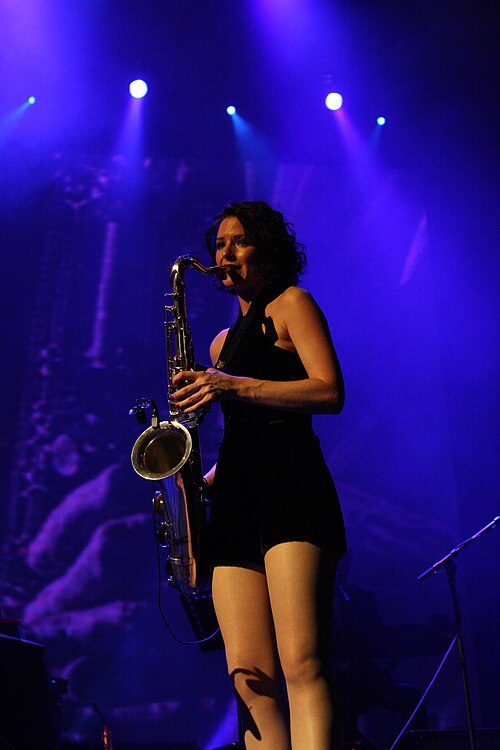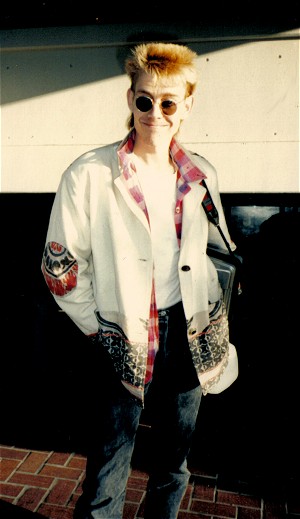1970–1983
In November 1970, Bryan Ferry, who had just lost his job teaching ceramics at a girls' school for holding impromptu record-listening sessions, [1] advertised for a keyboardist to collaborate with him and Graham Simpson, a bassist he knew from his Newcastle art-college band, the Gas Board. Andy Mackay replied to Ferry's advertisement, not as a keyboardist but a saxophonist and oboist, though he did have a EMS VCS 3 synthesizer. Mackay had already met Brian Eno during university days, as both were interested in avant-garde and electronic music. Although Eno was a non-musician, he could operate a synthesizer and owned a Revox reel-to-reel tape machine, so Mackay convinced him to join the band as a technical adviser. Before long, Eno was an official member of the group. Rounding out the original sextet were guitarist Roger Bunn (who had issued the well-regarded solo studio album Piece of Mind earlier in 1970) [2] and drummer Dexter Lloyd, a classically trained timpanist. In 1971, Roxy Music recorded a demo tape of some early compositions. In the spring of that year, Lloyd left the band, and an advertisement was placed in Melody Maker saying "wonder drummer wanted for an avant rock group". [3] Paul Thompson responded to the advertisement and joined the band in June 1971. Bunn left the group at the end of the summer of 1971, and in October, Roxy advertised in Melody Maker seeking the "Perfect Guitarist". The successful applicant was David O'List, former guitarist with the Nice. [4] Phil Manzanera—soon to become a group member—was one of about twenty other players who also auditioned. Although he did not initially make the band as a guitarist, the group were impressed enough with Manzanera that he was invited to become Roxy Music's roadie, an offer which he accepted. In December 1971, after a year of writing and rehearsing, Roxy Music began playing live, with their first show at the Friends of the Tate Gallery Christmas show in London. [5] In early February 1972, O'List quit the group abruptly after an altercation with Paul Thompson, which took place at their audition for David Enthoven of E.G. Management. When O'List did not show up for the next rehearsal, Manzanera was asked to come along on the pretext of becoming the band's sound mixer. When he arrived, he was invited to play guitar and quickly realised that it was an informal audition. Unbeknownst to the rest of the group, Manzanera had learned their entire repertoire and as a result, he was immediately hired as O'List's permanent replacement, joining on 14 February 1972.
E.G. Management financed the recording of the tracks for their debut album, Roxy Music , recorded in March–April 1972 and produced by King Crimson lyricist Peter Sinfield. [6] During the first half of 1972, bassist Graham Simpson became increasingly withdrawn and uncommunicative, which led to his leaving the band almost immediately after the recording of the debut album. He was replaced by temporary bassists: Peter Paul played with the band for a BBC radio session on 23 May 1972, Rik Kenton took over for the rest of 1972, [7] and John Porter played on the second album For Your Pleasure , released in March 1973, and its subsequent tour. [8] [9]
In July 1973, Brian Eno left Roxy Music amidst increasing differences with Ferry. [10] [11] He was replaced by 18-year-old multi-instrumentalist Eddie Jobson, formerly of progressive rockers Curved Air, who played keyboards and electric violin. Roxy would also undergo several more changes in bassist over the next few years. The band's next three albums– Stranded (1973), Country Life (1974) and Siren (1975)– were recorded with John Gustafson (ex-Merseybeats and Quatermass) on bass, though the only time he played live with Roxy Music was during the first half of the Siren tour in 1975. Other Roxy bassists during this period were Sal Maida on the 1973/74 Stranded tour, John Wetton (ex-Family and King Crimson, future Uriah Heep, U.K., Wishbone Ash and Asia member) on the 1974/75 Country Life tour, and Rick Wills (future Foreigner member) on the second half of the 1975/76 Siren tour. The Siren tour also saw the addition of backing singers Doreen Chanter and Jacquie Sullivan, nicknamed "The Sirens". Roxy Music disbanded in June 1976. Their live album Viva! was released two months later.
Roxy Music reunited during 1978 to record a new studio album, Manifesto . The band was now a core quartet of Ferry, Mackay, Manzanera and Thompson, augmented both in the studio and on stage by various backing musicians. Bassists Alan Spenner and Gary Tibbs and keyboardist Paul Carrack (ex-Ace, future Squeeze and Mike and the Mechanics member) are the only external musicians credited on the album, although it later came to light that a number of other musicians also contributed to the sessions. [12] On the subsequent Manifesto tour, Tibbs and keyboardist Dave Skinner played alongside Ferry, Mackay, Manzanera and Thompson.
After the tour and before the recording of the next album, Flesh + Blood (1980), Thompson broke his thumb in a motorcycle mishap and took a leave from the band. After Ferry, Mackay and Manzanera completed the album with several session drummers, Thompson rejoined them, briefly, in the spring of 1980 and made some television appearances as part of the album's early promotion. By the time the Flesh + Blood tour properly began, Thompson had left again due to musical differences with Ferry. [13] Roxy continued as a core trio of Ferry, Mackay and Manzanera, augmented by a variety of musicians over the next few years including Alan Spenner, Gary Tibbs, Paul Carrack, drummer Andy Newmark and guitarist Neil Hubbard. Later, with more sombre and carefully sculpted soundscapes, the band's eighth—and final—studio album, Avalon (1982), was recorded at Chris Blackwell's Compass Point Studios. Ferry, Mackay and Manzanera toured extensively from August 1982 to May 1983, [14] with a backing band consisting of Newmark, Spenner, Hubbard, Jimmy Maelen (percussion), future Dire Straits member Guy Fletcher (keyboards) and Tawatha Agee, Michelle Cobbs and Fonzi Thornton (all backing vocals). [15] The Avalon tour was documented on the live albums The High Road , released in March 1983, and Heart Still Beating , released in October 1990. Roxy Music officially split after completion of the tour in May 1983.
Reunions
Ferry, Manzanera, Mackay and Thompson re-formed in 2001 to celebrate the 30th anniversary of the band and toured extensively. Other musicians for their 2001 tour included Colin Good (piano), Zev Katz (bass), Julia Thornton (percussion, keyboards), Lucy Wilkins (keyboards, violin), Sarah Brown (backing vocals) and Chris Spedding (guitar). [16]
Their 2003 tour included returning musicians Good, Spedding and Thornton, along with Mark Smith (bass), Louise Peacock (violin, keyboards) and Michelle John and Sharon White (backing vocals). [17] Good, Spedding, Thornton and Peacock also stayed for their 2005 tour, alongside David Williams (guitar) Guy Pratt (bass) and Sarah Brown and Me'sha Bryan (backing vocals). [18] Only Pratt stayed into 2006, alongside Andy Newmark (Drums; replacing the ailing Thompson), Oliver Thompson (guitar), Leo Abrahams (guitar) and Me'sha Bryan and Joy Malcolm (backing vocals) and Louise Clare Marshall (backing vocals & keyboards). [19]
Roxy Music remained inactive until 2010 when they toured again with a band of Colin Good (piano and keyboards), Oliver Thompson (guitar), Sewuese Abwa Hannah Kemoh, Aleysha Lei (Gordon) (backing vocals), Anna Phobe (violin), Jerry Meehan (bass) [20] and for three dates, Andy Newmark (drums). [21] And again into 2011 with Colin Good (piano), Oliver Thompson (guitar), Jerry Meehan (bass), Sewuese Abwa (vocals), Aleysha Lei (Gordon) (vocals), Hannah Kemoh (vocals), Jorja Chalmers (keyboards & saxophone) and Tara Ferry (percussion). [22] In a Rolling Stone Magazine interview on 3 November 2014, Manzanera stated that Roxy had been inactive since 2011 and were unlikely to perform together again. [23] On 29 March 2019, Roxy Music were inducted to the Rock and Roll Hall of Fame, with Ferry, Mackay, Manzanera and Eddie Jobson performing a six-song set at the Barclays Center in Brooklyn, New York. [24] The band included Jorja Chalmers (saxophone & keyboards), Luke Bullen (drums), [25] Neil Jason (bass), Chris Spedding (guitar), Fonzi Thornton and Tawatha Agee (backing vocals); [26] all musicians (minus Bullen) had performed with the band in the past.
Roxy Music reformed in 2022 for a 50th anniversary tour of the United Kingdom and the United States to be held that autumn. [27] The band included Christian Gulino (musical director & keyboards), Tom Vanstiphout (guitar), Jorja Chalmers (sax & keys), Neil Jason (bass), Nathen 'Tugg' Curran (percussion), Chloe Beth Smith (keyboards) and Fonzi Thornton, Senab Adekunle and Phebe Edwards (backing vocals). For UK dates, Gulino was replaced by Richard Cardwell. [28]



































